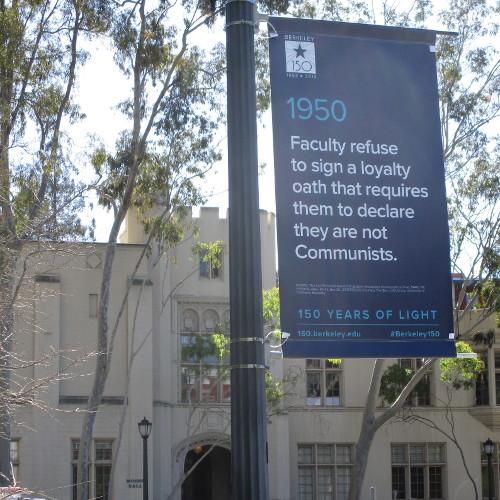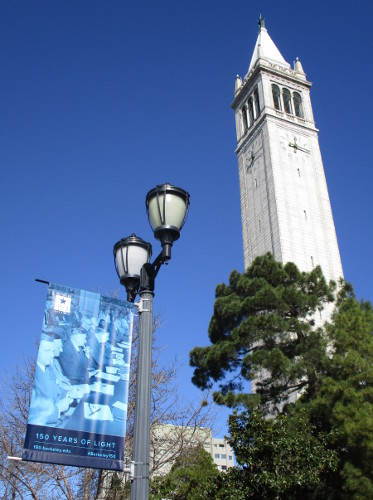
David Fifield

When I arrived at UC Berkeley in August 2013, after having accepted an offer of admission and moved into an apartment, I was blindsided by the California State Loyalty Oath, which all state employees who are U.S. citizens are required to sign. The first that I heard of it was when I went in to do the necessary paperwork to become employed by the university as a GSR (graduate student researcher). The conversation went something like this:
“Here's your tax form, your health insurance form, loyalty oath, ...”
“Loyalty oath?”
“Everybody has to sign a loyalty oath.”
“I’m not signing any loyalty oath.”
“You have to sign the oath.”
“Whatever else happens today, there’s no way I’m signing a loyalty oath.”
“Everybody signs the oath.”
So I walked out without doing any of the paperwork, and began considering my options. This was a time of crisis for me, and my spirits were low. I had to reckon with possibly canceling my admission, only weeks after having accepted UC Berkeley’s offer and turned down others. After a few agonizing weeks, my advisor Doug Tygar worked out a way to pay my tuition and stipend from non-university sources, so that I could be a student without being a university employee. And so it remained, until I graduated in December 2018.
Needless to say, no one calling themself an American should have anything to do with a loyalty oath. A free government should not demand it, and a free citizen should not sign it. I have heard of some (and spoken to one) who object either to oaths in general or to violent action on behalf of the state. For me, it purely a matter of principle. To sign a loyalty oath would be a compromise of my personal ethics.
The most disappointing part of my experience is that it was exceptional. There must be hundreds of new graduate students and professors—let alone all the other state employees in California!—who sign the oath without thinking, who don’t discuss it with their peers, who don’t question what it means or represents. There are only a few cases I know of in recent times of people refusing to sign; a few of them are listed below. In one of the many meetings early on trying to understand my options, I stated that I didn’t feel a need to cause a stir about my refusal to sign, and one of the assistants, a Quaker who had her own reservations about the oath, said “I wish you would.”
To those who would sign such an oath without thinking, or who say “it doesn’t really mean anything,” I say, Did you never take a civics class? Do you make all promises so lightly? If you will sign something called an oath without intending to honor it, what would it take for you to make a statement that someone could actually trust?
The root of the loyalty oath is in 1950s McCarthyism, a sad time for American principles. The oath at that time was worded differently, but the idea was the same. Some brave professors rightly objected, and some lost their jobs over it. The university likes to pretend that the oath lies in the past and is now only a historical curiosity: in 1999 they hosted a 50-year “retrospective” symposium. But the oath remains as ever. As evidence of the regents’ continuing hypocrisy, see this banner hung before the Campanile in Spring 2018 for the 150th anniversary of UC Berkeley, awarding itself a job well done for having once protested a policy that remains in full effect today.


Being at UC Berkeley was an irreplaceable experience, and in the main I enjoyed my time there. But it still burns me up when I think of that stooge in the engineering support office: “Everybody signs the oath.”
Despite bitter fights over it during the 1940s and 1950s, which led to the public resignation of several professors, the State of California still requires University employees like professors and Teaching Assistants to swear a loyalty oath to the government. The phrasing of the oath has been toned down somewhat, and the responsibility for the requirement has moved from the Regents to the State, but it has never been eliminated.
In 1992 when I arrived at the University of California San Diego, after moving 2700 miles to get there, I was presented without warning with a loyalty oath that would have required me to “support and defend. . . the Constitution of the State of California against all enemies” and which affirmed that “I take this obligation freely, without any mental reservation.” I refused to sign it, because freedom of thought within an academic community demands tolerance of all political beliefs, even those whose praxis would constitute a threat to the state and its institutions. I therefore could not support Article XX of the California Constitution, which restricts university employment to those who support the state. And I certainly could not truthfully affirm that I had no mental reservation to subscribing to the oath — or that I were subscribing freely, given that my student stipend depended on my signing.
It’s not that I have any reservations about bearing “true faith and allegiance to the Constitution of the United States and the Constitution of the United States of America” or supporting and defending them “against all enemies, foreign and domestic”—although as a lecturer in a freshman class I won't exactly be called upon to defend the state against its enemies or execute its laws. But I love my country and its Constitution as much as anyone. It’s rather that I object to being required to prove my loyalty to state simply to teach a class. I feel the same way about the Pledge of Allegiance—do children really need to swear not betray their country every morning before school starts? Is treason really a big problem among elementary school children?
When I first read the oath, I wondered about the reference to “mental reservation.” Aren’t professors trained to have questions, doubts, and reservations about pretty much everything? Did the requirement to “support and defend” the Constitution conflict with SF State’s expectation that I would teach critical perspectives on the history of constitutional law? Could I sign the oath because, paradoxically, the U.S. and California constitutions refer to rights of free speech and expression?
Over the next several weeks, I found myself thinking about which parts of the U.S. Constitution might generate the most mental reservations in California’s professoriate. The three-fifths clause, which stipulated that each slave would be counted as 3/5 of a person when seats were allocated in the House of Representatives? The fugitive slave clause? The 18th Amendment, which banned the manufacture, sale, transportation, importation, or exportation of intoxicating liquors?
In 1949, during the Cold War, the Board of Regents of the University of California imposed a requirement that all University employees sign an oath affirming not only loyalty to the state constitution, but a denial of membership or belief in organizations (including Communist organizations) advocating overthrow of the United States government. Many faculty, students, and employees resisted the oath for violating principles of shared governance, academic freedom, and tenure. In the summer of 1950, thirty-one “non-signer” professors—including internationally distinguished scholars, not one of whom had been charged of professional unfitness or personal disloyalty—and many other UC employees were dismissed. The controversy raised critical questions for American higher education.